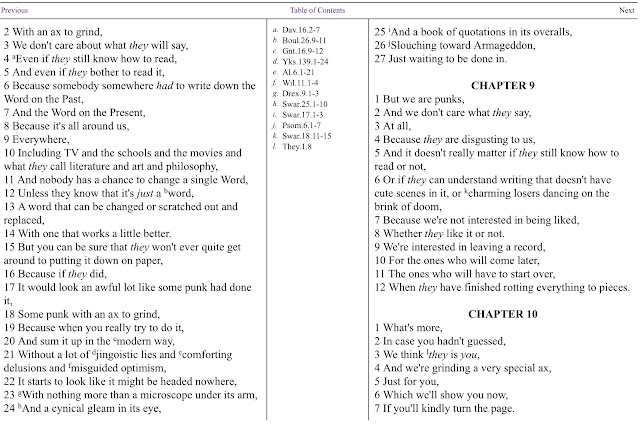Response to a Friend
Dear Lisa,
Thank you for your thoughtful response. I understand the objections to Death of the Republic as a traditional print book. When you describe the content as a blog, however, I can’t help inferring a certain snobbery at work. Yes, the content could be reworked along more conventional lines, but it would rapidly become academic rather than evocative. What’s the worst thing about blogs? They are temporal things, closely tied to timelines and topical furors. They are seen as emotional, largely uninformed outbursts rather than real writing. I get that. The first novel ever written was a blog. Pamela. We remember Samuel Pepys and James Boswell for their diaries, the first of which was written, oops(!), before the first novel. In which case Pepys invented blogging before Richardson invented the novel — based on the same device.
The novel has since died, killed by — among others — me. It no longer serves as a vehicle of truth. Whereas diaries still can. Witness William Shirer’s Berlin Diary. While for Greatest Generation types the preferred journalistic model is now the after-the-fact-know-all analysis, á la Norman Mailer, Noam Chomsky, and new age journalists like Tom Wolfe and Hunter Thompson, who do real writing. Got it.
But I have done a lot of “real” writing. The Boomer Bible. Punk City. White Privilege. The Reckless Twenties, as well as multimedia projects like Shuteye Town and Shuteye Nation that included abundant text. (Maybe I should explain: I got blackballed by American publishing companies for this piece of writing — The Naked Woman, also literary and original.) When I enter the realm of politics, though, I explictly reference and demark the timeline. My Obama book, for example, dismissible by the print press as a collection of blog entries because there are dates of entries. Why? For the simple reason that I can prove I knew before anyone else who he really was and what he was up to. Blogs tie you to what you said in the past. They are accountability wrIt large. All the political pundits who write books about contemporary events have to use footnotes and inset quote blocks to try to prove they knew something way back when. Dull dull dull.
Death of the Republic was written while the constitutional crisis we now face was unfolding, in real time. Time after time throughout the Trump presidency, I predicted what would happen and why. The blogspot manuscript I asked you to read put my analysis and my predictions on the line, myself on the block. I’m on record. If I’m right, pay attention. If I’m wrong, move along, nothIng to see here.
But I have been right, all along. To me, that willingness to be accountable in a way political pundits never are for their years of bungled predictions is the most important part of Death of the Republic.
As I said, I thank you for trying. And I thank Adam for reading. I am not bitter or even angry at your shared decision that I am unpublishable. Many years ago, I wrote this in The Boomer Bible:
From The Punk Testament, Book of They:
Ironically, my sister made a prediction of her own back then. We disagree about nearly everything. She is a professor emeritus at the University of Oklahoma, having earned her PhD. at Cornell for a dissertation on Little Women. We rarely speak now. But when she read The Boomer Bible and comprehended the implications of hyperlinks in text before there was an Internet, she told me, “This is the last print book.” Sadly, she was right. (Something else a traditional print book can’t do: “There isn’t any God.”)
Thanks again. You might want to check in occasionally at Instapunk Returns. I have a very dramatic image piece that will appear there later today.
Don’t feel bad for me. The Boomer Bible was a gift I was given. It wrote me, not the other way around. Everything else, all 20-some books and millions of blog words (cf. Laird Ink), has been gravy. Just wanted to do my last bit in a 50-year battle I have sorrowfully lost.
Oh. And something Adam Bellow will never understand. Quantum 19.











Comments